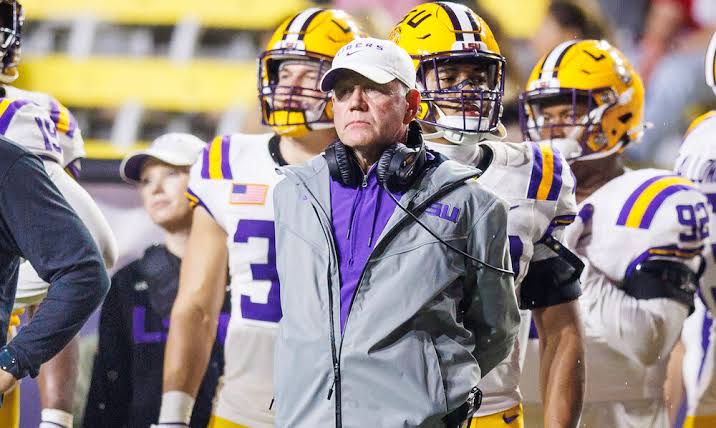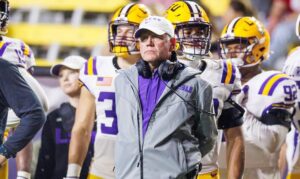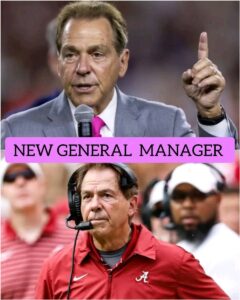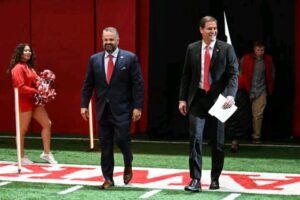
Brian Kelly Frustrated with LSU’s Run Defense After Loss to Alabama

After a hard-fought loss to Alabama, LSU head coach Brian Kelly did not hold back in expressing his frustration with his team’s inability to stop the Crimson Tide’s ground game. The Tigers fell 42-28 to Alabama in a game that saw the Tide dominate the trenches and impose their will with a relentless running attack. Kelly, in his post-game remarks, pointed to the defense’s struggles against the run as a major factor in the defeat.
The loss to Alabama marked LSU’s second straight year of falling short to their SEC rivals, but it was the lack of physicality and discipline in the Tigers’ defense that Kelly highlighted as a key area of concern. Alabama’s offensive line, led by standout performances from their big men upfront, opened up gaping holes for their running backs, who capitalized on the opportunities.
Alabama rushed for 180 yards and four touchdowns, with running back Jase McClellan and quarterback Jalen Milroe both finding success on the ground. Milroe’s 47-yard touchdown run, in particular, stood out, as it exposed gaps in LSU’s defensive front that Kelly described as “unacceptable” at this stage of the season.
“They just beat us up front,” Kelly said bluntly in his post-game press conference. “It’s disappointing because we pride ourselves on being physical, and we were not. You can’t expect to win big games, especially against a team like Alabama, when you get pushed around like that. The run defense was porous, and it’s something we’ve got to fix immediately.”
Kelly’s frustration was palpable, especially after a week in which LSU had preached the importance of improving its defensive line play. Going into the game, LSU’s defense had shown flashes of improvement in certain areas, particularly in their pass rush, but stopping the run remained a glaring vulnerability. Alabama took full advantage, using a balanced attack that kept LSU on its heels.
The Tigers’ front seven, which had been a point of pride earlier in the season, struggled to maintain gap integrity and failed to wrap up tackles. In addition to McClellan’s steady yardage on the ground, Milroe was able to extend plays with his legs, creating even more problems for LSU’s defense. Kelly emphasized the need for better tackling, as missed opportunities on crucial downs allowed Alabama to sustain drives and control the tempo of the game.
“Too many missed tackles, and that’s on us as coaches,” Kelly added. “We’ve got to be better, and we will be better. It’s not about effort—our guys were trying—but you’ve got to be more disciplined in your assignments, and we didn’t do that today.”
The LSU defense also struggled with maintaining gap control, a crucial element of defending the run. On several occasions, Alabama’s offensive line was able to get to the second level and open up running lanes that allowed their backs to break off big gains. LSU defenders were often caught out of position, with linebackers overcommitting or failing to read the play, allowing Alabama to gain positive yardage consistently.
The frustration from Kelly was understandable. Despite being a top-10 team and national championship contender, LSU had not been able to put together a complete defensive performance against elite opponents. The loss to Alabama dropped LSU’s record to 7-2 on the season, with both of their losses coming to top-tier SEC competition.
Kelly did not shy away from the hard truths following the game, stating that LSU had plenty to work on before their next matchup. “It’s about accountability,” he said. “We need to hold ourselves to a higher standard, and that includes every single player and coach. We’re not going to back down from that.”
As LSU looks to regroup for the rest of the season, the focus will undoubtedly shift to fixing the issues on defense. Kelly’s candid assessment of the team’s shortcomings serves as both a wake-up call and a challenge for his players. With a trip to the SEC Championship still within reach, LSU will need to address their defensive lapses quickly if they are to contend with the best teams in the conference and, ultimately, make a deep run in the college football playoff race.







